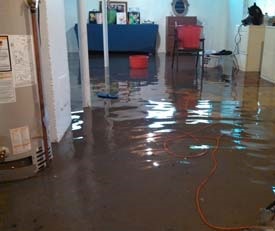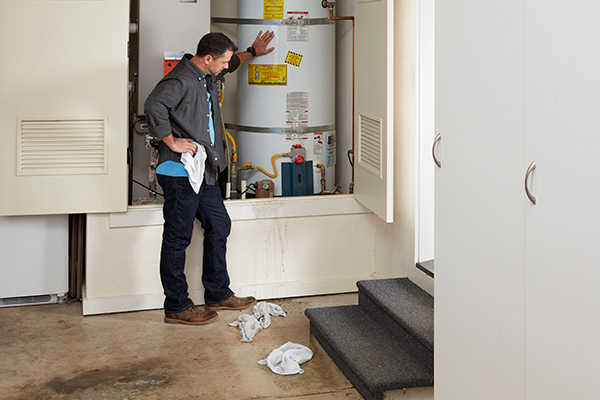Crucial Guidelines for House Owners Handling Broken Heating Units
Crucial Guidelines for House Owners Handling Broken Heating Units
Blog Article
How do you feel on the subject of What Do You Do When Your Water Heater Bursts??

Whether it is situated in the cellar or a different room, busted water heating units can cause stress. Having no warm water supply is also problematic.
Shut Down Power Source
Before calling the plumber, turned off a gas hot water heater by transforming the temperature dial. This is usually located at the top of the thermostat. Switch over off the circuit breaker if you have a version that runs on electric power. This will certainly prevent electrocution, particularly if there is a leak as water is a conductor. Typically, the burner shuts down when the water hits a specific temperature. With a damaged storage tank, it may malfunction. Sufficing off ensures you remain safe.
Cut Off the Cold Water Supply
Cut off the tanks faucet water supply from the resource. This goes from your main water line right into the container. When your storage tank is in good condition, the cold water quits filling out when the storage tank is full. Because it is leaking, the water will certainly continue to stream. Shut the valve found at the top of the heating unit. Revolve this clockwise to shut it off. You must turn off that primary water supply line outside your residential or commercial property if you can not find it or reach it.
Call the Plumber
After doing the first 2 safety actions, you need to call your plumber ahead right now to take care of a burst water heater. However, remember that your system will certainly not just conk out substantially overnight. There are normally indications that your aging water heater has debris buildup in the interior. Remember of the following:
Rather, as quickly as you spot these indicators, have a specialist come to check your water heater give thanks to. Normally, water heating systems have a lifespan of regarding 8 to 12 years.
Clean Up Residential property
After calling the plumber, paper damages by taking notes and photos so you can assert your home owner's insurance. Eliminate any kind of standing water to avoid mold and also mildew growth. If you have a completely submersible water pump, make use of that to drain the water.
Keep in mind, if you observe any kind of problems with your water heater, call the pros as soon as possible. You can not take this trouble gently due to the fact that a damaged thermostat can elevate water temperature to a precariously high level, resulting in unintended burns. A damaged heater stress safety valve can additionally cause a surge. For best outcomes, obtain a yearly check so your device gets examined, cleaned up, drained pipes, and refilled, assuring ideal performance.
Whether it is situated in the basement or a separate space, broken water heaters can cause tension. Before calling the plumber, closed off a gas water heater by turning the temperature dial. After doing the initial 2 safety actions, you should call your plumber to come right away to deal with a ruptured water heater. If you have a submersible water pump, use that to drain pipes the water. Bear in mind, if you notice any concerns with your water heating unit, call the pros right away.
Is My Water Heater Broken?
The Water Heater is Old
No appliance will last forever. This includes a home’s water heater. During its lifespan, residents are going to face a situation where a new water heater installation will be necessary. The biggest problem with this is that most people are not sure when their water heater expires. Not knowing this can lead to serious risks if the unit begins to act up due to old age.
Most makes and models of water heaters will last between eight and 10 years. While 10 years is the age when water heater replacement is highly recommended, the need to replace the unit may occur before this time or after. If the unit doesn’t show any symptoms of a problem, it is a good idea to replace it at the 10-year mark (from the manufacture date).
Some of the symptoms that indicate a new unit is needed include rusting, leaks, noises, and a failure to heat up the water. Also, note that not all units have a 10-year life expectancy. The main exception to this rule is that a gas unit will last for six to eight years.
Rusty Heater Inlet Valve or Water
While steel is the strongest material on earth, it does have a weakness – rust. If corrosion occurs on a steel surface, it will begin to spread and eat through the steel in certain areas. On water tanks and pipes that are made of steel, rust is a warning sign of an impending leak.
The issue for many is trying to figure out if the rust is coming from the water heater or the pipes that lead to the faucet. If rust is seen, it is a clear indication that water heater service from the professionals is needed.
If rusty water appears out of the faucets in the bathtub or sink, it likely means a rusty water heater. If there is rust near the water inlet or the pressure relief valve, rust has likely developed inside the tank. If tap water appears rusty, it may be an issue with the pipes.
Strange Sounds from the Water Heater
Are there strange sounds coming from the tank? As a water heater gets older, rumbling noises may develop and get louder and louder as the water in the tank heats up. In homes where large amounts of hot water are used, the issue is likely going to be even more obvious when more serious issues arise. If there is a strange or loud noise coming from the unit, it is probably because of sediment buildup. A good way to remedy this problem is by flushing the heater. If this does not work, then a new unit may need to be installed.
Leaks
As a water heater gets closer to the end of its useful life, there is a higher chance there will be water around the tank. If there is water, this usually means leaks are occurring. Based on where the unit is located in the home, a leak may result in serious property damage.
Leaks are usually caused by expansions in the metal tank. The expansions occur as time passes and as the inside body of the tank is exposed to multiple heating cycles per day. When a fracture forms, the gap will be slight enough to hold the water in; however, in more serious situations, this will not be the case. If the tank is idle, the water will not leak but when the metal expands during each heating system, small amounts of water will get through the gap.

I hope you enjoyed reading our excerpt about What Do You Do When Your Water Heater Bursts?. Thank you so much for taking a few minutes to read our piece. Do you know about another person who is curious about the subject? Why not promote it. Thank you for going through it.
Immediate assistance? Ring! Report this page